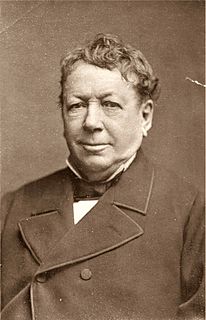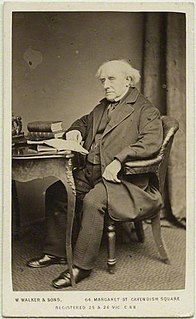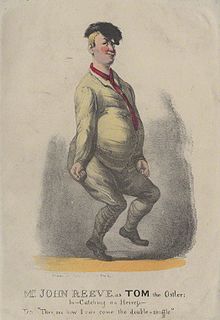
John Barnett was an English composer and writer on music.
This article contains information about the literary events and publications of 1847.

John Baldwin Buckstone was an English actor, playwright and comedian who wrote 150 plays, the first of which was produced in 1826.

Lucy Isabella Buckstone was an English actress born to a noted British stage family. She was perhaps best remembered for her portrayals of Annette in the Leopold David Lewis drama The Bells, and Lucy Ormond in Peril by Scott and Stephenson.

Frances "Fanny" Elizabeth Fitzwilliam was an English actress.

The Private Secretary is an 1883 farce in three acts, by Charles Hawtrey. The play, adapted from a German original, depicts the vicissitudes of a mild young clergyman, innocently caught up in the machinations of two irresponsible young men who are bent on escaping their creditors.

The Wicked World is a blank verse play by W. S. Gilbert in three acts. It opened at the Haymarket Theatre on 4 January 1873 and ran for a successful 145 performances, closing on 21 June 1873. The play is an allegory loosely based on a short illustrated story of the same title by Gilbert, written in 1871 and published in Tom Hood's Comic Annual, about how pure fairies cope with a sudden introduction to them of "mortal love."
William Leman Rede was one of the many prolific and successful playwrights who composed farces, melodramas, burlettas, and travesties, primarily for theatres such as the Olympic, Strand, and Adelphi, in the early nineteenth century. He proudly proclaimed himself a follower of Thomas Frognall Dibdin, W. T. Moncrieff, James Robinson Planché, Douglas William Jerrold, and John Baldwin Buckstone-writers who established the "minor drama." This term referred to plays that were produced at venues other than Covent Garden, Drury Lane, and the Haymarket, the "patent theatres" that had a legal monopoly on the presentation of serious, non-musical productions. The minor dramas did so well, however, that the patent theatres soon augmented their own bills with the same type of fare.

John Copeland Buckstone was an English stage and film actor of the late Victorian and Edwardian eras, who was most famous for his 1901 stage play Scrooge, which was the basis for the first film version of A Christmas Carol in the same year. He was the son of the noted actor John Baldwin Buckstone and the brother of Lucy Isabella Buckstone.

Elizabeth Yates (1799–1860) was an English actress. She appeared on the stage under the names Miss Brunton, Elizabeth Brunton, Elizabeth Yates, Mrs. Yates, and Mrs. Yates late Miss Brunton.
The Battle of Hastings is a 1778 play by the English writer Richard Cumberland. It is a tragedy set around the Battle of Hastings in 1066. It was staged at the Drury Lane Theatre in October 1778 by Richard Brinsley Sheridan. Sheridan later mocked Cumberland's sensitivity to criticism by modelling the character Sir Fretful Plagiary, in his 1779 play The Critic, after him.
Clementina is a tragic play by the Irish writer Hugh Kelly. It was first staged at Covent Garden Theatre in February 1771. The plot follows a young Italian woman Clementina's marriage to Rinaldo despite her father's opposition to the wedding as he had wished her to marry Palermo. It ends with Palmero killing Rinaldo, and Clementina committing suicide in her despair.

Robert Keeley was an English actor-manager, comedian and female impersonator of the nineteenth century. In 1823 he originated the role of 'Fritz' in Presumption; or, the Fate of Frankenstein, the first known stage adaptation of Mary Shelley's novel Frankenstein.
Agis, A Tragedy is a blank verse tragedy by the Scottish dramatist John Home. It was his first play, but has been greatly overshadowed, by his second play Douglas. It was first performed in 1747.
Edward Richard Wright (1813–1859) was an English comedian and actor.

John Reeve (1799–1838) was an English comic actor. His early career was based on mimicry: he became a popular favourite, able to continue in highly-paid work, despite drinking heavily and not learning his parts.
George Herbert Buonaparte Rodwell (1800–1852) was an English composer, musical director, and author.
Braganza is a 1775 tragedy by the Irish writer Robert Jephson. It portrays the overthrow of Spanish rule in Portugal during the seventeenth century, leading to the establishment of the Braganza Dynasty.
Virginia is a 1754 tragedy by the British writer Samuel Crisp. The play is set in Ancient Rome, and portrays the story of Appius and Virginia.
Luke the Labourer; Or, The Lost Son is an 1826 play by the British writer John Baldwin Buckstone. It was originally performed at the Adelphi Theatre in London's West End. The play addressed the recent spate of rural unrest in Britain, choosing to set it in the present rather than more safely in a historical setting as other works did. The play is notable for its title character, a sympathetic villain.










